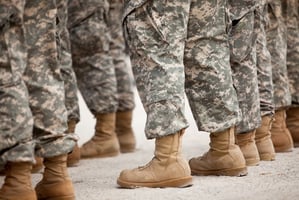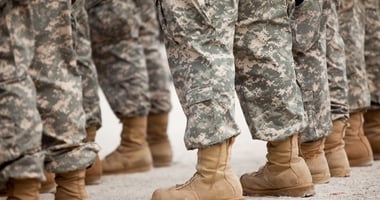Timing of First, Second Deployments May Influence Soldiers’ Risk of Suicide, Study Suggests
 |
“These time-related deployment variables are potentially modifiable risk factors for SA [suicide attempt],” wrote Robert J. Ursano, M.D., of the Uniformed Services University of the Health Sciences in Bethesda, Md., and colleagues. “Further consideration should be given to how well the timing of first deployment corresponds with the U.S. Army’s training and preparedness goals for new soldiers.”
While a previous study found that soldiers who were deployed in their first year of service were at an elevated risk of death by suicide in the short term, it was unknown what long-term impact deployment within the first year may have on suicidal behavior during or after subsequent deployments.
Ursano and colleagues analyzed data from Army Study to Assess Risk and Resilience in Servicemembers (Army STARRS), which includes health information on more than 1.5 million soldiers who were on active duty between January 1, 2004, and December 31, 2009. They identified 593 soldiers with a medically documented suicide attempt during or after their second deployment, as well as 19,034 matched controls with two deployments.
After adjusting for sociodemographic factors, service-related characteristics (such as age at entry into U.S. Army) and mental health history, Ursano and colleagues found that the odds of a suicide attempt during or after the second deployment were twice as high among soldiers whose first deployment occurred within the first 12 months of service compared with those who deployed after 12 months.
Although the duration of the first deployment was not associated with a higher risk for suicide attempt, the researchers found that the length of time between the first and second deployments (dwell time) was a factor in suicide attempts during or following the second deployment. Soldiers with a dwell time of six months or less had 1.6 higher odds of suicide attempt compared with those with dwell times of more than six months.
Further analysis suggested that suicide attempts might be reduced by about 14% if all soldiers served in the U.S. Army for more than 12 months before their first deployment. Additionally, dwell time of longer than six months for all soldiers could result in a 4% reduction in suicide attempts among those who have deployed twice, the authors noted.
“Future research that examines factors associated with DT [dwell time], including type and extent of social support at home, training and reset opportunities, parenting and household responsibilities and challenges, and family and financial stressors, would provide a better understanding of the association between this period and SA [suicide attempt] risk,” Ursano and colleagues concluded.
To read more on this topic, see the Psychiatric News article “Suicide Attempts Linked to Previous Attempts in Soldiers’ Unit, Says Army Study.”
(Image: iStock/MivPiv)





